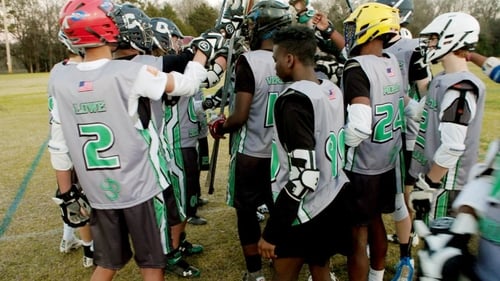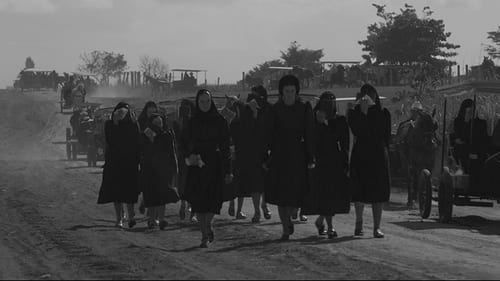Desert Coffee (2017)
No roads, electricity or water. But the best cup of coffee in the county.
Género : Documental
Tiempo de ejecución : 53M
Director : Mikael Lypinski
Sinopsis
In the Californian part of the Sonoran desert, in the close vicinity of military bases, there is a “wild” town called Slab City inhabited by the refugees from the American Dream. Of different age, they brought with them various stories, but all chose freedom, even for the price of the most basic comforts. The only place equipped with electricity is a makeshift Internet café run by Rob which serves “the best coffee in the neighbourhood”.

Two first-time filmmakers stop their lives to find out why rhinos are being killed for their horns. Carving out six months for the project, the women quickly find themselves immersed in a world far larger and more dangerous than they had imagined, only emerging from their odyssey four years later.

Point Blank is an investigative documentary on police violence and corruption perpetrated in Rio de Janeiro in the past 20 years. It vividly portrays the most emblematic incidents that occurred during this period through the perspective of family members, witnesses, survivors, and other people who were directly involved in such cases. The film starts with the notorious Vigario Geral Massacre of 1993 and culminates with the executions ordered and carried out by law enforcement agents in 2012 and 2013. These brutal facts are presented based on witness reports that reconstruct the memory of the few who survived the slaughters.

Despite never having played the game before, a group of underprivileged teens emerge as a talented lacrosse team under the tutelage of Coach Bobby Selkin.

The very first documentary about Jane Elliott's educational experiment about discrimination, which was originally produced for ABC News, in which she conducts an unforgettable lesson with her third-grade class in Riceville, Iowa.

In Sutarkhali, a small village on the Bangladeshi coast, a family, having suffered from the endless floods and storms, tries to rebuild its life.

A documentary about the eponymous Puerto Rican boxer

La película es sobre la vida y las actividades de Hermógenes Cayo, un artesano de la Puna jujeña que se desempeñó toda su vida como santero y telero donde pintaba retratos con temperas o tallaba imágenes religiosas en madera, así como el medio en el que vivía. Cayo falleció un año antes del estreno del filme en 1968 y en marzo de 2006 sus obras (70 piezas) luego de ser restauradas por la Fundación Antorchas fueron exhibidas en museos.

Romania, 1986: Gregor and Vali want to get away. Both need each other, yet there is mutual distrust. One night Gregor finds his doubts confirmed. In the end only hope is left.

The "Field of Magic" is a docu-poem about people living for over two decades in the Buda forest, near the closed down Kariotiskes dump in Lithuania. After four years of work, this film captures the perspective of the dump dwellers. It tells the story about the dissolving community, its uniqueness, daily routine, specific way of life, every-day joys and sorrows.

La desazón suprema: retrato incesante de Fernando Vallejo es un documental sobre el escritor colombiano Fernando Vallejo. Siguiendo una estructura literaria y una intensa intertextualidad con obras de Vallejo y otros escritores, el documental consta de un prólogo con epígrafe y nueve capítulos alrededor de diferentes episodios de la vida del escritor.

Mariquilla, la gitana más linda de Granada, anda en amores con Lucas, soldado de la guarnición de La Alhambra. Pero el tío Pichón, padre de Mariquilla, quiere casarla con don Cosme, viejo y rico escribano al servicio del Corregidor de la ciudad. Para escapar del compromiso, la gitana utilizará al gobernador, también viejo pero un caballero.

A man with no illusions marries a young woman who is brimming with idealism. She attempts to remake her husband with her overflowing optimism, but the marriage is severely strained when her first pregnancy ends in miscarriage. They separate, and the woman has a number of affairs, but eventually she returns to her husband. They have a daughter, then settle down to a life that is a blend of the husband's worldliness and the wife's idealism.

Lunch Break features 42 workers as they take their midday break in a corridor stretching nearly the entire shipyard.

This documentary chronicles the life of expatriate writer Paul Bowles through archival footage, photos and interviews with the author, who talks about his writing, his friendships with artists such as Tennessee Williams and Aaron Copland and more. Shot in Tangier, Morocco (Bowles's longtime home), this revealing portrait sketches out Bowles's rebellious life story, including his love relationships with men and women, his drug use and his music. - Paul Bowles, Edouard Roditi, Allen Ginsberg

For generations, the Salamanca community of Mennonites has been living in the same modest and rigidly organized way. Modern-day scenes are accompanied by a voice-over narrating a man’s recollections of his youth. “As soon as I close my eyes,” he explains, “I go back to the past, to the moment when I made the choice that shaped my entire life.” Speaking in the Plautdietsch language, he talks calmly of the strong curiosity he felt as a young boy about the world beyond Salamanca and the Mennonite faith – a curiosity for which he paid dearly.

Hellion — "Shum bola", a film on the eponymous story of Gafur Gulyam about the adventures of a little boy, whose restless character makes him different people and life situations.

The third part of Euripides’ trilogy relates Orestes’ confrontation with the people of Argos after killing his mother Clytemnestra and her lover Aegisthus, and his struggle to defend himself and his heritage – with the support of his sister, Electra.

Documentary depicting what happened to the characters in the film Terra para Rose, made by the same director. Shows the life of some 1500 families of landless rural laborers who, for the first time in 1985, occupied an unproductive large landholding, the Annoni plantation in Rio Grande do Sul. After camping out for years in tents, facing down the police and negotiating with the government, the former landless laborers have managed to turn their dream into reality, and are now successful small farmers.

Inspired by the German folktale, Wilhelm, a file clerk, falls in love with a huntsman's daughter. In order to marry, Wilhelm must prove his worth as a hunter and gain her father's approval. Naive and desperate, he makes a deal with a devil named Pegleg.





